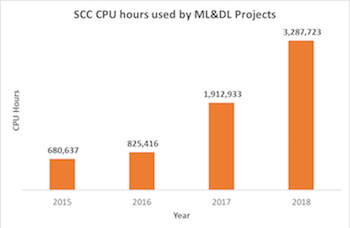Artificial Intelligence (AI) has permeated many areas of our society. From healthcare and transportation to intelligent assistants such as Siri and Alexa, AI has become commonplace in our everyday lives. Today much of Artificial Intelligence is driven by Machine Learning (ML) algorithms that self-learn by training on large sets of data. Deep Learning (DL), a subset of ML inspired by the brain’s neural networks, is being widely adopted due to the availability of specialized hardware such as graphic processing units (GPUs). ML & DL are playing larger roles here at Boston University in both research and academics. IS&T’s Research Computing Services (RCS) group and BU’s Shared Computing Cluster (SCC) are increasingly supporting their adoption and use.
Research Computing’s Support of Machine and Deep Learning in Research
The adoption of Machine and Deep Leaning techniques in research at BU has grown rapidly over the past few years. RCS now supports over 40 research projects that utilize ML & DL in their research analysis on the SCC. Research areas for some of these projects include: Computer Science, Engineering, Earth Science, Physics, Neuroscience, Medicine, Accounting, and Marketing.


RCS supports this research by installing specialized software applications that utilize ML & DL techniques. Researchers and their teams receive consulting and training from RCS on how to integrate these applications into their workflows. Taking advantage of the SCC, which includes specialized GPU hardware, provides researchers a way to effectively scale their analyses.

Assistant Professor Vijaya Kolachalama
One example of how the research community has adopted ML & DL can be found in the work of Assistant Professor Vijaya Kolachalama in the Department of Medicine. Recently RCS worked with Dr. Kolachalama on his project that uses Deep Learning techniques to diagnose and quantify kidney disease from biopsy slides. RCS assisted in developing and optimizing the computational workflow; the analysis was performed on the SCC. The hope is that one day Machine Learning can assist nephropathologists in their work as well as provide aid to areas of the world where expert nephropathologists are not available. This research, partially supported by the Hariri Institute and BU Undergraduate Research Opportunity Program (UROP), was highlighted earlier this year. The results, published in the KIReports journal, acknowledged RCS and the SCC.
Research Computing’s Support of Machine and Deep Learning in Academia
RCS has long supported a broad range of academic courses requiring advanced computing technology and software on the SCC. This support includes in-classroom training by RCS staff, installation of a variety of specialized software packages, and management of student accounts. The number of courses featuring ML & DL has grown at a rapid pace over the past two years with RCS supporting more than 450 students in a total of eight courses. These courses include: Machine Learning (in both CAS and MED), Topics in Computer Science / Special Topics in Computer Engineering, Image and Video Computing, and Applied Statistical Modeling for the MS Statistical Practice (MSSP) Program. The Computer Engineering and Computer Science departments have purchased GPU compute nodes through the Buy-in program to further expand computational resources available to their students and help support course use on the SCC.

In addition to RCS’s efforts to support Machine and Deep Learning, the Hariri Institute is also playing a major role in promoting the adoption and use of these technologies through the recently formed Artificial Intelligence Research (AIR) initiative. This cross-disciplinary program brings together researchers focused on machine learning of intelligence and promotes AI education at Boston University.
